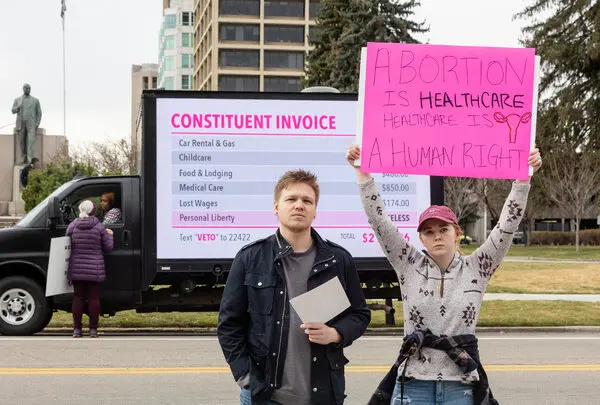The Idaho Bill
On March 14, 2022, Idaho became the first state to adopt a copycat of Texas’ new abortion law that uses ordinary citizens as a legal loophole to enforce a ban on abortions after about six weeks of pregnancy. The Idaho legislation is called the “heartbeat bill,” and it allows family members of what the legislation called “a preborn child” to sue an abortion provider with a reward of at least $20,000 up to four years after they performed the abortion.
The Idaho bill does provide exceptions for rape or incest, unlike the Texas law, but requires that the individual file a police report and show this to a provider before receiving an abortion. Some reasons that survivors of sexual violence often do not file a police report because re-telling the assault may cause trauma, fear of retaliation from the offender, fear of being ignored, or not being believed, according to Georgetown Law. “In fact, reporting a sexual assault incident to the police is the exception and not the norm.” However, if an individual does not file a police report, they can be sued under the Idaho bill by grandparents, siblings, aunts, uncles, and the fetus's father. While a rapist cannot sue the individual getting an abortion, this is not a meaningful restriction as siblings of a rapist can still sue abortion providers.
The Legal Loophole
In a 1973 case called Roe v. Wade, the U.S. Supreme court ruled that abortions cannot be prevented before fetal viability. Fetal viability was defined in the majority opinion by Justice Harry Blackmun as when the fetus “has the capability of meaning life outside the mother’s womb.” While in 1973, that was about 28 weeks, modern technology has determined that a fetus is viable outside the womb at 23 weeks. Roe v. Wade established a precedent for abortions to be legal up until fetal viability in the U.S. It is a court decision used as authority for subsequent court cases involving similar facts. Therefore, typically, the Supreme Court will intervene if a bill violates the 23-week rule under the precedent of Roe v. Wade.
However, the Texas abortion law was the first to have ordinary citizens act as an enforcement mechanism for preventing abortions, rather than the state, to avoid the legal oversight that the precedent of Roe v. Wade provides. This subversive tactic worked, and the Supreme Court ultimately decided not to intervene because neither Texas nor Idaho would act as the enforcement mechanism for banning abortions or prosecuting individuals who elect to have one. Since the state is not the enforcement mechanism, abortions are not criminalized, meaning that a person who has an abortion will not face jail time. However, they will face financial repercussions in the form of a lawsuit.
Why Six Weeks is a Problem
According to a study collected for the Centers for Disease Control and Prevention’s National Survey of Family Growth, between 2009 and 2013, 45% of pregnancies were unplanned in the United States. Many people do not know they are pregnant at six weeks due to the unpredictability of periods and the lack of sex education in the United States. The Office on Women’s Health at the Department of Health and Humans Services explains that factors such as stress, essential medications, and uncontrolled diabetes can all delay a period.
Therefore, if a person does not get their period in 4 weeks, they may believe it is due to another factor rather than pregnancy. Both Texas and Idaho laws only allow a person two weeks after a missed period to determine if they are pregnant and get an abortion. In practicality, this is a complete ban on abortions based on when most abortions occur in the U.S; ⅔ of which occur at eight weeks or earlier, and 88% occur within the first 12 weeks, according to the Guttmacher Institute.
The second reason the six-week limit is a problem is the lack of sexual education in the United States. Thirty-seven states require abstinence information to be provided, and only 13 states mandate that sex education information is medically accurate, according to a 2016 report for the Guttmacher Institute. Both abstinence information and medically inaccurate information are unsuccessful methods of preventing pregnancies. Further, a 2014 study from the Centers for Disease Control and Prevention’s School Health Policies and Practices found that 87% of high schools allow parents/guardians to exclude their children from sex education altogether, meaning that these students have limited sex education knowledge.
The Future of Abortions
Both lawmakers in Texas and Idaho hope to limit the number of abortions in their states. However, 2022 data from Planned Parenthood shows that these laws do not limit the overall number of abortions. Abortion patients with a Texas zip code were over 50% of all abortion patients at Planned Parenthood health centers in Oklahoma from September-December. This is a stark contrast to September to December 2020, when only 10% of all abortion patients had a Texas zip code, indicating a 2500% increase since Texas’ heartbeat act passed. Further, there was a 1000% increase in abortion patients with a Texas zip code at Planned Parenthood health centers in Colorado. These statistics show that people who want and need to get abortions will continue to do so in surrounding states, while those who cannot afford the time and money to travel may die trying.


Comments